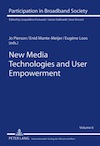Book: New Media Technologies and User Empowerment
Jo Pierson, Enid Mante-Meijer and Eugène Loos (eds.)
Peter Lang – International Academic Publishers
May 2011
317 pages
ISBN 978-3-631-60031-3
Synopsis
Recent developments in new media devices and applications have led to the rise of what have become known as “social media”, “Web 2.0”, “social computing” or “participative web”.. This shift in ICT, from unidirectional to conversational media of mass self-communication has lowered the technological thresholds for everyday users to cooperate for their own benefit, to participate in online environments and social network sites, to co-create business value and to become “produsers” or “pro-ams”. At the same time, we see an evolution towards people-centred design and user-driven innovation in the design of new media technologies. This has created new opportunities and heightened expectations regarding user empowerment in different societal arenas.
However, the question remains to what extent users and communities interacting in an all-IP new media ecosystem are empowered (and not disempowered) to express their creativity and concerns in their social and cultural environment and to obtain a prominent role in the process of new media design and innovation. The book attempts to answer this question through a collection of chapters that scrutinise this issue. The different chapters focus on the way that social and economic opportunities and threats enable and/or constrain user empowerment.
This work consists of four major sections, each of which examines the (potential) empowerment/disempowerment of users in relation to new media technologies from a different angle. The chapters in the first section describe different theoretical perspectives on user roles and user involvement in the new media ecosystem, referring to interpretative, positivist and critical schools of thought. Based on these overall guiding frameworks, we then explore the leverage users have, both on content level and on technological level. This refers respectively to the second and third section of the book. In the fourth section different case studies are presented, each of which highlight how user empowerment manifests itself in different new media sectors and environments (such as publishing, the music industry and social networking sites).
The book is based on interdisciplinary research. It offers innovative insights based on state-of-the-art academic and industry-driven ICT user research in various European countries. This work will appeal to post-graduate students and researchers in the field of media and communication studies, social studies of technology, digital media marketing and other domains that investigate the mutual relationship between new media technologies and society.
Contents
- Yves Punie: Introduction: New Media Technologies and User Empowerment. Is there a Happy Ending?
- Enid Mante-Meijer/Eugène Loos: Innovation and the Role of Push and Pull
- Valerie Frissen/Mijke Slot: The Return of the Bricoleur: Redefining Media Business
- Serge Proulx/Lorna Heaton: Forms of User Contribution in Online Communities: Mechanisms of Mutual Recognition between Contributors
- Aphra Kerr/Stefano De Paoli/Cristiano Storni: Rethinking the Role of Users in ICT Design: Reflections for the Internet
- James Stewart/Laurence Claeys: Problems and Opportunities of Interdisciplinary Work Involving Users in Speculative Research for Innovation of Novel ICT Applications
- Marinka Vangenck/Jo Pierson/Wendy Van den Broeck/Bram Lievens: User-Driven Innovation in the Case of Three-Dimensional Urban Environments
- Mijke Slot: Web Roles Re-examined: Exploring User Roles in the Media Environment
- Philip Ely/David Frohlich/Nicola Green: Uncertainty, Upheavals and Upgrades: Digital-DIY during Life-change
- Eva K. Törnquist: In Search of Elks and Birds: Two Case Studies on the Creative Use of ICT in Sweden
- Levente Szekely/Agnes Urban: Over the Innovators and Early Adopters: Incentives and Obstacles of Internet Usage
- James Stewart/Richard Coyne/Penny Travlou/Mark Wright/Henrik Ekeus: The Memory Space and the Conference: Exploring Future Uses of Web2.0 and Mobile Internet through Design Interventions
- Sanna Martilla/Kati Hyyppä/Kari-Hans Kommonen: Co-Design of a Software Toolkit for Media Practices: P2P-Fusion Case Study
- Ike Picone: Mapping Users’ Motivations and Thresholds for Casually «Produsing» News
- Stijn Bannier: The Musical Network 2.0 & 3.0
- Enid Mante-Meijer/Jo Pierson/Eugène Loos: Conclusion: Substantiating User Empowerment
Authors
- Jo Pierson is Professor at the Vrije Universiteit Brussel – Department of Communication Studies / SMIT (Studies on Media, Information and Telecommunication)
- Enid Mante-Meijer is emeritus Professor at Utrecht University – Utrecht School of Governance
- Eugène Loos is Professor at the University of Amsterdam – Department of Communication Science / ASCoR (Amsterdam School of Communication Research).




